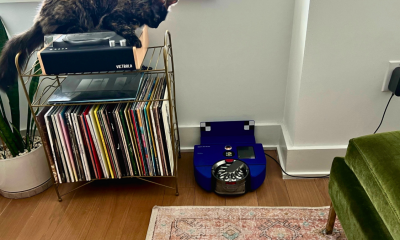Entertainment
‘Rocket Arena’ is a bright and colorful team shooter that misses its mark

EA’s new third-person shooter Rocket Arena is itself like a rocket. It’s colorful, ambitious, and bright — but it tends to miss its mark.
Developed by indie studio Final Strike Games and published by EA, Rocket Arena attempts a fresh take on class-based shooters by arming every single one of its combatants with rockets. No assault guns, no sniper rifles, no pistols — just rockets. There is still some variation, as each playable character has their own unique abilities. However, the core concept of this 3v3 team-based shooter remains splendid, pure rocketry.
The idea has undeniable potential. Unfortunately, after a couple of hours with the game, I found Rocket Arena much less explosive than I had hoped.
To its credit, Rocket Arena makes stabs at distinguishing itself from other team-based shooters. Rather than a health bar, players have a “blast meter” that increases as they take damage. Once filled, players are flung outside the arena — referred to as a “megablast” — and must wait to gently float back to the ground before they can resume play. This makes it feel like you’re still in the action, and the lack of death makes it very family-friendly, though functionally there is little difference in gameplay.
Players are able to dodge incoming rockets too, which feels satisfyingly skillful and was my favourite mechanic of the game. Seeing the count of how many projectiles you just avoided provides a good boost of confidence. Sadly, the dodge action has a not insignificant cooldown, so you can’t keep dancing with rockets indefinitely.
Rocket Arena further attempts to mix it up with various game modes, the most notable experiment being Treasure Hunt. In this mode, players fight to take possession of a treasure chest, earning their team more coins the longer they hold it. This repeatedly alternates with a round in which players race to collect coins scattered around the map.
While the coin-collecting rounds help differentiate Treasure Hunt from Rocket Ball, wherein teams fight over a ball and attempt to score goals, I found they diverted attention away from rocketry. More successful teams simply ignored their opponents, focusing on gathering coins rather than blasting their enemies, though the treasure chest rounds were enjoyable.
Rev’s hoverboard makes her a bit faster than other characters.

However, the greater miss is that shooting off rockets in Rocket Arena simply isn’t as satisfying as it should be. The joy of video game rocketry is in the weighty power of your projectiles, reveling in the delicious dichotomy of precision and splash damage. Rocket shooting brings to mind Pharah from Blizzard’s Overwatch or Soldier from Valve’s Team Fortress 2, whose slow but straight-firing weapons feel satisfying to launch and highly impactful.
In contrast, Rocket Arena’s rockets made me feel largely inconsequential. Numerous shots are needed to take out an opponent even when landing direct hits, making it seem like you’re firing pillows rather than shells. This is understandable to an extent, as being able to one-hit enemies would mean everyone might spend more time floating back into the arena than actually playing. Even so, it feels like there isn’t enough power in the rockets or even the illusion of it in the animation — and thus, not enough joy.
Direct hits aren’t easy to land either. Players are constantly in the air thanks to rocket jumping, triple jumping, and abilities such as Kayi’s Grapple Hook. This makes relying on splash damage unfeasible, effectively removing the appeal of rockets for people with slightly less precise aim.
The difficulty of landing hits combined with small team sizes makes it easy for one or two skilled players to completely dominate the game, so their teammates feel superfluous and their opponents give up. Though this issue may be mitigated by skill-based matchmaking, which hadn’t yet been implemented during my preview, I don’t see it going away entirely.
I wouldn’t call Blastbeard’s arcing Rocket Cannonball a rocket, but you do you I guess.

I also hesitate to even call some of the characters’ weapons “rockets.” Straight-shooting hero Jayto appealed to me the most, having the most traditional rocketry and being quick to pick up, but the arcing trajectory of Blastbeard’s projectiles made his firearm seem more like a grenade launcher than a rocket launcher, and Mysteen straight up flung cards. Even setting form aside, most weapons just didn’t have that satisfying, heavy rocket feel, losing much of the appeal of a rocket shooter.
Rocket Arena will have a roster of 10 cartoonish heroes at launch, with more to be added down the track, each with different abilities. For example, Kayi’s Snow Globe slows incoming projectiles while enhancing her own, Mysteen’s Phantasm lets her create and swap places with a double, and Amphora’s Hydro Form allows her to speed about as a manta ray-shaped blob of water, getting beneath enemies and sending them airborne.
However, characters’ abilities don’t complement one another like in Overwatch or Dota 2, so there isn’t much — or practically any — point in team coordination. A lot of the time you won’t even notice if or when others use their skills, and the game is too fast-paced to consider much strategy yourself. It’s a chaotic team game you functionally play solo.
Rocket Arena is enjoyable enough, just relatively average overall. It’s the type of game you’d mindlessly play for a few hours when unmotivated to do anything else, before loading up Overwatch for a better rocket feel. It’s still fun to jump in with friends — but maybe only for an evening or two.
Rocket Arena is out July 14 on Windows, PlayStation 4, and Xbox One for $29.99.
-

 Business5 days ago
Business5 days agoAPI startup Noname Security nears $500M deal to sell itself to Akamai
-

 Business6 days ago
Business6 days agoUS think tank Heritage Foundation hit by cyberattack
-

 Entertainment5 days ago
Entertainment5 days agoNASA discovered bacteria that wouldn’t die. Now it’s boosting sunscreen.
-

 Entertainment5 days ago
Entertainment5 days agoHow to watch ‘Argylle’: When and where is it streaming?
-

 Business4 days ago
Business4 days agoTesla drops prices, Meta confirms Llama 3 release, and Apple allows emulators in the App Store
-

 Entertainment4 days ago
Entertainment4 days ago‘The Sympathizer’ review: Park Chan-wook’s Vietnam War spy thriller is TV magic
-

 Business3 days ago
Business3 days agoTechCrunch Mobility: Cruise robotaxis return and Ford’s BlueCruise comes under scrutiny
-

 Entertainment5 days ago
Entertainment5 days agoDyson 360 Vis Nav robot vacuum review: Dyson should just stick to upright vacuums




















